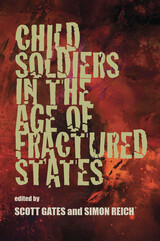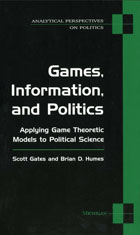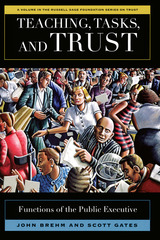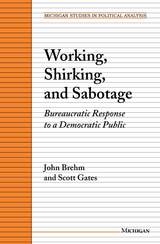4 books about Gates, Scott

Child Soldiers in the Age of Fractured States
Scott Gates
University of Pittsburgh Press, 2010
Current global estimates of children engaged in warfare range from 200,000 to 300,000. Children's roles in conflict range from armed and active participants to spies, cooks, messengers, and sex slaves. Child Soldiers in the Age of Fractured States examines the factors that contribute to the use of children in war, the effects of war upon children, and the perpetual cycle of warfare that engulfs many of the world's poorest nations.
The contributors seek to eliminate myths of historic or culture-based violence, and instead look to common traits of chronic poverty and vulnerable populations. Individual essays examine topics such as: the legal and ethical aspects of child soldiering; internal UN debates over enforcement of child protection policies; economic factors; increased access to small arms; displaced populations; resource endowments; forced government conscription; rebel-enforced quota systems; motivational techniques employed in recruiting children; and the role of girls in conflict.
The contributors also offer viable policies to reduce the recruitment of child soldiers such as the protection of refugee camps by outside forces, “naming and shaming,” and criminal prosecution by international tribunals. Finally, they focus on ways to reintegrate former child soldiers into civil society in the aftermath of war.
The contributors seek to eliminate myths of historic or culture-based violence, and instead look to common traits of chronic poverty and vulnerable populations. Individual essays examine topics such as: the legal and ethical aspects of child soldiering; internal UN debates over enforcement of child protection policies; economic factors; increased access to small arms; displaced populations; resource endowments; forced government conscription; rebel-enforced quota systems; motivational techniques employed in recruiting children; and the role of girls in conflict.
The contributors also offer viable policies to reduce the recruitment of child soldiers such as the protection of refugee camps by outside forces, “naming and shaming,” and criminal prosecution by international tribunals. Finally, they focus on ways to reintegrate former child soldiers into civil society in the aftermath of war.
[more]

Games, Information, and Politics
Applying Game Theoretic Models to Political Science
Scott Gates and Brian D. Humes
University of Michigan Press, 1997
To study the strategic interaction of individuals, we can use game theory. Despite the long history shared by game theory and political science, many political scientists remain unaware of the exciting game theoretic techniques that have been developed over the years. As a result they use overly simple games to illustrate complex processes. Games, Information, and Politics is written for political scientists who have an interest in game theory but really do not understand how it can be used to improve our understanding of politics. To address this problem, Gates and Humes write for scholars who have little or no training in formal theory and demonstrate how game theoretic analysis can be applied to politics. They apply game theoretic models to three subfields of political science: American politics, comparative politics, and international relations. They demonstrate how game theory can be applied to each of these subfields by drawing from three distinct pieces of research. By drawing on examples from current research projects the authors use real research problems--not hypothetical questions--to develop their discussion of various techniques and to demonstrate how to apply game theoretic models to help answer important political questions. Emphasizing the process of applying game theory, Gates and Humes clear up some common misperceptions about game theory and show how it can be used to improve our understanding of politics.
Games, Information, and Politics is written for scholars interested in understanding how game theory is used to model strategic interactions. It will appeal to sociologists and economists as well as political scientists.
Scott Gates is Assistant Professor of Political Science, Michigan State University. Brian D. Humes is Associate Professor of Political Science, University of Nebraska-Lincoln.
[more]

Teaching, Tasks, and Trust
Functions of the Public Executive
John Brehm
Russell Sage Foundation, 2008
The mere word "bureaucracy" brings to mind images of endless lines, piles of paperwork, and frustrating battles over rules and red tape. But some bureaucracies are clearly more efficient and responsive than others. Why? In Teaching, Tasks, and Trust, distinguished political scientists John Brehm and Scott Gates show that a good part of the answer may be found in the roles that middle managers play in teaching and supporting the front-line employees who make a bureaucracy work. Brehm and Gates employ a range of sophisticated modeling and statistical methods in their analysis of employees in federal agencies, police departments, and social service centers. Looking directly at what front-line workers say about their supervisors, they find that employees who feel they have received adequate training have a clearer understanding of the agency's mission, which leads to improved efficiency within their departments. Quality training translates to trust – employees who feel supported and well-trained for the job are more likely to trust their supervisors than those who report being subject to constant monitoring and a strict hierarchy. Managers who "stand up" for employees—to media, government, and other agency officials—are particularly effective in cultivating the trust of their workers. And trust, the authors find, motivates superior job performance and commitment to the agency's mission. Employees who trust their supervisors report that they work harder, put in longer hours, and are less likely to break rules. The authors extend these findings to show that once supervisors grain trust, they enjoy greater latitude in influencing how employees allocate their time while working. Brehm and Gates show how these three executive roles are interrelated—training and protection for employees gives rise to trust, which provides supervisors with the leverage to stimulate improved performance among their workers. This new model—which frames supervisors as teachers and protectors instead of taskmasters—has widespread implications for training a new generation of leaders and creating more efficient organizations. Bureaucracies are notorious for inefficiency, but mid-level supervisors, who are often regarded as powerless, retain tremendous power to build a more productive workforce. Teaching, Tasks, and Trust provides a fascinating glimpse into a bureaucratic world operating below the radar of the public eye—a world we rarely see while waiting in line or filling out paperwork. A Volume in the Russell Sage Foundation Series on Trust
[more]

Working, Shirking, and Sabotage
Bureaucratic Response to a Democratic Public
John Brehm and Scott Gates
University of Michigan Press, 1999
Bureaucrats perform most of the tasks of government, profoundly influencing the daily lives of Americans. But who, or what, controls what bureaucrats do?
John Brehm and Scott Gates examine who influences whether federal, state, and local bureaucrats work, shirk, or sabotage policy. The authors combine deductive models and computer simulations of bureaucratic behavior with statistical analysis in order to assess the competing influences over how bureaucrats expend their efforts. Drawing upon surveys, observational studies, and administrative records of the performance of public employees in a variety of settings, Brehm and Gates demonstrate that the reasons bureaucrats work as hard as they do include the nature of the jobs they are recruited to perform and the influence of both their fellow employees and their clients in the public. In contrast to the conclusions of principal-agency models, the authors show that the reasons bureaucrats work so hard have little to do with the coercive capacities of supervisors.
This book is aimed at students of bureaucracy and organizations and will be of interest to researchers in political science, economics, public policy, and sociology.
"This book is breathtaking in its use of models and techniques. . . . The approach developed by Brehm and Gates allows us to re-open empirical questions that have lain dormant for years." --Bryan D. Jones, University of Washington
John Brehm is Associate Professor of Political Science, Duke University. Scott Gates is Associate Professor of Political Science, Michigan State University.
John Brehm and Scott Gates examine who influences whether federal, state, and local bureaucrats work, shirk, or sabotage policy. The authors combine deductive models and computer simulations of bureaucratic behavior with statistical analysis in order to assess the competing influences over how bureaucrats expend their efforts. Drawing upon surveys, observational studies, and administrative records of the performance of public employees in a variety of settings, Brehm and Gates demonstrate that the reasons bureaucrats work as hard as they do include the nature of the jobs they are recruited to perform and the influence of both their fellow employees and their clients in the public. In contrast to the conclusions of principal-agency models, the authors show that the reasons bureaucrats work so hard have little to do with the coercive capacities of supervisors.
This book is aimed at students of bureaucracy and organizations and will be of interest to researchers in political science, economics, public policy, and sociology.
"This book is breathtaking in its use of models and techniques. . . . The approach developed by Brehm and Gates allows us to re-open empirical questions that have lain dormant for years." --Bryan D. Jones, University of Washington
John Brehm is Associate Professor of Political Science, Duke University. Scott Gates is Associate Professor of Political Science, Michigan State University.
[more]
READERS
Browse our collection.
PUBLISHERS
See BiblioVault's publisher services.
STUDENT SERVICES
Files for college accessibility offices.
UChicago Accessibility Resources
home | accessibility | search | about | contact us
BiblioVault ® 2001 - 2024
The University of Chicago Press









